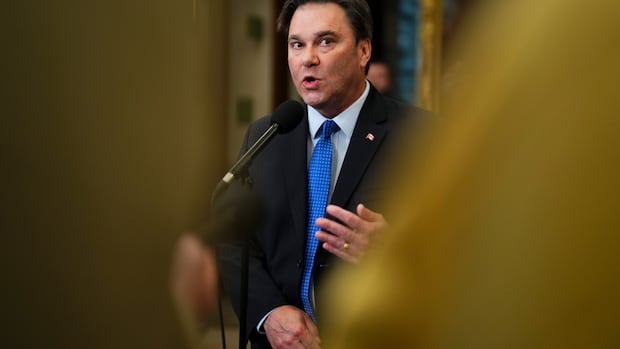Understood: Who Broke the Internet?41:11Kick ‘Em in the Dongle
When life hands you tariffs, fix the internet.
At least, that’s what Cory Doctorow hopes might happen. Because, he says, Canada’s internet is in desperate need of saving.
“We created a policy environment that rewards companies and executives who do things that are bad for the internet and bad for internet users, and that does not punish them when they do things that harm us,” said Doctorow, a tech journalist, activist, and host of the CBC podcast Understood: Who Broke the Internet?.
He believes that the current trade troubles could actually free Canada to fix how it polices the internet — more in line with the rest of the world, but less restrictive than the U.S.
That’s because the current state of Canada’s internet policy is directly connected to trade pressure — specifically tariff threats — surrounding internet and copyright law from the United States decades ago.
But since free trade with our southern neighbours is already in turmoil, Doctorow says it’s time to unlock our internet by removing laws that benefit big tech companies, and opening up access for users.
The start of internet laws
Like many countries, Canada’s internet laws can be traced back to two treaties from the UN’s World Intellectual Property Organization (WIPO) in 1996. It asked signatories to protect copyrights online.
Canada signed the two treaties, but wouldn’t ratify them until over a decade later.
But the U.S. moved quickly and ratified its version of copyright laws in 1999, the Digital Millennium Copyright Act (DMCA).
Michael Geist, a law professor at the University of Ottawa and Canada Research Chair in internet and e-commerce, says the American act heavily favoured copyright holders, but held few protections for users.
And the U.S. wanted other countries to follow their lead.
“They then oftentimes either use direct bilateral trade pressure or trade agreements to try to take that U.S. position and make it the standard for how you implement a treaty that was otherwise very flexible in nature,” said Geist.
In 2007, Stephen Harper’s Conservative government introduced a bill that Geist says was basically a Canadian version of the DMCA.
Geist said that for decades, copyright laws in Canada protected the copyright holder, without limiting how a person could use a product.
But the new bill allowed for digital locks on software, which are technologies used to protect copyrighted content and prevent people from tinkering with the program.
“This idea that you could use technology, now aided by legislation, to effectively remove or lock users out of what is their rights struck me as enormously problematic,” said Geist.
What are digital locks, and why do they matter?
One example of a digital lock, says Doctorow, is how Apple prevents iPhone users from downloading third-party apps onto the device.
Apple says it’s for your protection, as it vets the apps in its store to prevent you from downloading anything harmful.
But because of the digital lock, Apple is also able to take 30 per cent of the cost of every purchase made on its app store without any competition. And Doctorow says its argument of security doesn’t exactly check out.
“This is no longer about you trusting Apple and choosing Apple. This is about Apple requiring you to trust them,” said Doctorow.
“Any time someone puts a lock on something that belongs to you and doesn’t give you the key, that lock isn’t there for your benefit.”

Following pushback from Geist and others on the initial proposed bill, the government introduced a new version. But much to Geist’s disappointment, it still had those digital locks he was concerned about.
The reason? The U.S. threatened that if locks weren’t included, Canada could say goodbye to tariff-free trade with the United States.
“The U.S. had been clear that it wanted copyright reform, but even more than just any old copyright reform, it wanted U.S.-style legal protections for these digital locks,” said Geist.
“If there was one thing this legislation was going to do, it was going to remove this ongoing trade irritant with the United States.”
The bill was pushed through and labelled Bill C-11. And its impact was felt quickly.
Doctorow says people working on accessibility software to programs they didn’t own, such as screen readers for ebooks, had to stop, because they were worried about what digital locks might be waiting for them.
A group that was building tools to access public government data had to halt their work because their lawyers advised them it could get them in trouble.

“What happened was you saw a procession of extremely abusive technologies creating the opportunities for extremely high margins at the expense of Canadian consumers. And no Canadian company stepped up to bypass or correct these market failures,” said Doctorow.
That’s because, thanks to digital locks, they legally couldn’t.
James Moore, the heritage minister at the time, told CBC in an email that he still agrees and supports the bill, saying “Canada has obligations to our trading partners to protect [intellectual property].”
What can be done
Canada’s trade relationship with the U.S. is now more uncertain than ever, thanks to President Donald Trump’s unpredictable regime of tariffs.
But even though it’s a bad situation, Doctorow says, it’s an opportunity for Canada to do something it should’ve done before.
Since it was trade pressure that pushed Canada to go above and beyond what the WIPO treaties required, and that trade situation is in flux, Doctorow says Canada has the chance to change its digital copyright laws to something more in line with the rest of the world, and isn’t as restrictive as the U.S.’s laws.
“We could change our law so that it was only illegal to break a digital lock if you also infringed someone’s copyright. You don’t have to infringe anyone’s copyright to install your own app store on your iPhone,” said Doctorow.
The European Union moved in this direction in April, by fining Apple 500 million euro ($788-million Cdn) for not allowing third-party app stores on its phones.
The fine was issued under the EU’s Digital Markets Act, designed to give consumers and businesses more choice and prevent big tech companies from cornering digital markets.

This wouldn’t just give you more freedom on your phone, says Doctorow. It also means a company like Apple would have to compete with other companies to earn your business.
Tinkerers and innovators in Canada could build ways to improve all aspects of how we use the internet, says Doctorow, converting the internet from a walled garden to a public space.
But Geist isn’t so confident it will happen.
“I fear that … in our zeal to deal with the very real threats that we see from Trump on tariffs and on a number of other things with respect to Canada, we’ll give on some issues simply because the hope will be that that will be enough to address some of these other concerns that are ultimately seen as even more significant,” said Geist.





